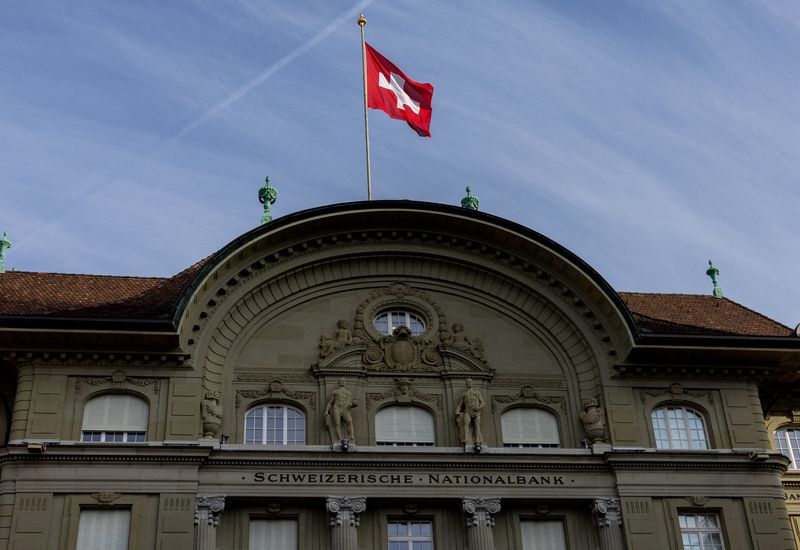By Indradip Ghosh
BENGALURU (Reuters) -The Swiss Nationwide Financial institution will once more minimize its key coverage charge by 25 foundation factors on Dec. 12, in response to an over-85% majority of economists polled by Reuters, with most anticipating the speed to achieve near-zero in 2025, decrease than beforehand thought.
Monetary market pricing is pushing extra towards a bigger 50 bps discount given weak Swiss inflation and the SNB’s aversion to a strengthening Swiss franc, up round 2% towards the euro since a September coverage assembly.
Switzerland has the bottom inflation charge amongst main economies. However with the Swiss economic system increasing at a reasonable tempo and the bottom price of borrowing already at a meagre 1.0%, scope for an even bigger discount is proscribed.
Over 85% of economists, 27 of 31, within the Dec. 5-9 Reuters ballot predicted the Swiss central financial institution would minimize its important charge by 25 bps to 0.75% on Dec. 12, a couple of hours earlier than the European Central Financial institution is anticipated to chop by the identical quantity.
Solely 4 forecast the SNB to chop by 50 bps.
“Market pricing may make a 25bp rate cut a slightly hawkish surprise, but we continue to see no reason – and also little chance of lasting success in terms of the exchange rate – for larger cuts given the resilient economy and stable exchange rate,” Christian Schulz, deputy chief European economist at Citi, stated.
However he anticipated the SNB to downgrade its short-term forecasts once more, including “the SNB’s guidance will likely remain dovish”.
LOW INFLATION
Swiss inflation rose to 0.7% in November, nicely under the center of the SNB’s most popular 0-2% vary and is the bottom amongst G10 economies. It’s forecast to common simply 0.7% and 1.0% in 2025 and 2026, respectively, in response to ballot medians.
The SNB was extra modest in elevating charges than main friends following the pandemic, solely reaching 1.75% from a deeply damaging charge, and has already minimize by 75 bps since March.
Simply over half of economists, 15 of 28, count on charges to fall to both 0.25% or zero subsequent 12 months. In a September ballot, no economist had charges under 0.50% subsequent 12 months.
Switzerland already has the second lowest rate of interest amongst main economies after Japan, which has taken charges up in child steps this 12 months to 0.25%.
In distinction to in Japan, the Swiss central financial institution is coping with a powerful forex that’s maintaining inflation low.
The Swiss franc will weaken however is unlikely to surrender all of its latest features over the approaching 12 months, a separate Reuters ballot discovered.
That was based mostly on expectations the European Central Financial institution will minimize charges no less than by 100 bps in 2025, greater than the SNB, to protect the euro zone economic system from anticipated U.S. tariffs early subsequent 12 months.
Karsten Junius, chief economist at J. Safra Sarasin expects sluggish euro space development will hamper Swiss exports as that’s the place most of them go.

“We expect a further decline of inflation in the coming months such that risks to price stability are clearly on the lower side,” added Junius, who sees a 50 bps minimize on Thursday.
(Different tales from the Reuters international financial ballot)




